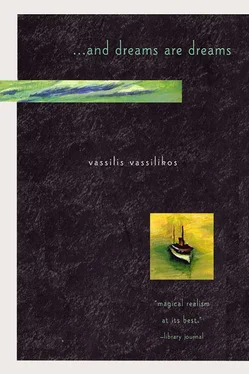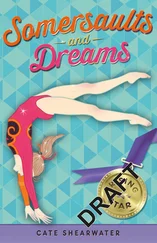“Of course, it’s still a little expensive,” he said, speaking of plasterboard, “but like all products whose price is dictated by demand, as soon as production is increased, its price will tend to go down.”
The yacht, with its permanent crew (the pensioner captain, the new captain, the two stewards, the cook, and the engineer), was moored at the island port, and the passengers had gone ashore to eat fritters. That was when the conversation about plasterboard and the fiberglass insulation that goes with it began. The doctor had observed that, for the past two days they had been on board, the blond young man who was now speaking had not uttered a single word. He and his young wife had behaved like crew members, even though they were guests. The industrialist was only concerned with speargun fishing. At the table he would exchange a few words with the others about the food; he always had a pleasant but impenetrable face. Now this conversation, concerning his line of work, seemed to have awakened him, just as they were eating their fritters.
It was late September, and this long weekend cruise under the sweet light (the sun was warm this time of year, without scorching) had gathered a disparate crew, strangers to one another, on Elias’s yacht, which he had offered them free of charge.
During the summer, Elias would rent out his yacht to tourists. It slept ten, and whenever there was a free place, he would invite friends to come along to keep him company. But this time, perhaps for lack of customers because the season was almost over, he had reserved it entirely for his friends. Among them was the doctor, who, without his wife, became a sort of observer of the others.
It was late Saturday afternoon when they docked at the island. They went ashore for a walk; somebody had suggested they have fritters. They would have dinner later, on the yacht. Having spent all day swimming, they now felt pleasantly tired, worn out by their exposure to the sun and sea.
It was a little chilly. The barbarous waves of summer holiday makers had passed over the island,leaving behind echoes of their money and their humming. The islanders, calmer types, considered themselves lucky that this year not a single pine had been burned. The islanders were Greeks of Albanian descent. Their island, close to Athens, was known as a resort for a certain high society that came and went on hovercrafts each weekend, almost all year round.
The doctor was bored. He found the sea tiring and the others uninteresting. He thought of his abandoned dissertation, his experiments that he would start again on Monday, the little mice he had been working with, and he tried to convince himself he had done well to come on the cruise.
Two social classes were represented on the yacht: on the one hand the workers of the sea, and on the other the bourgeoisie of dry land. The workers were faceless. They wore masks. For them, other people’s entertainment was their job. But they loved their boss, Elias, just as the young captain loved his grandfather.
The old captain was on the yacht illegally. He was retired and wasn’t really supposed to be on the vessel.
But since that was the only job he knew, and he would surely waste away on dry land, Elias had kept him on, and, to keep the port authorities happy, had hired his young grandson who had just graduated from the Merchant Marine School. The same way one doesn’t put a faithful dog to sleep just because it’s grown old, he kept the old captain on board.
This yacht was an original out of the Hydra shipyards. It had changed with the passage of time, but its principal characteristics remained unaltered: the three masts and the long and narrow frame of a corvette. The captain’s grandfather and great-grandfather had also been sea captains (which was why he called himself “captain, son of a captain, descendant of captains”), on the very same ship, which, or so his ancestors claimed, had taken part in the Greek War of Independence. Later the ship had been used by sponge divers; during the Asia Minor disaster, it had carried refugees from Smyrna. During World War II, it had sailed to the Middle East. It was only after the war, and once it was taken over by the arms manufacturer Bodossakis, that the ship changed considerably and was fitted with modern engines from Sweden. Just before he died, Bodossakis sold it to Elias’s father, and now Elias rented it out to tourists and also used it himself when the opportunity arose. But the old captain was one with the ship’s hull. Just like his forefathers before him, he was part and parcel of the ship, and his grandson was getting ready to succeed him.
“But what have you two been talking about all this time?” Persephone asked the young industrialist and the architect.
“Business,” replied the former, smiling broadly.
And he ate the last of his fritters.
Persephone was the only one who had ordered ice cream instead of fritters — she couldn’t bear syrupy desserts. The others all stole a little of her whipped cream to put on their fritters. The two flavors complemented perfectly.
A lively conversation brings those engaged in it closer erotically. The words they speak, even if they are of dry and odorless building materials, uttered on a sweet September evening, become the carriers of another conversation that is not expressed openly, yet is implied, moving like a current under the skin, because words are one’s breath modeled into certain sounds that correspond to something more vital, and when it comes to a man and a woman talking passionately and for quite some time, even if they disagree (and especially in that case), desire does not take long to pass into their breath, to moisten their words in such a way, that you, the outsider, the observer, can picture their bodies joined together, still talking fervently about plasterboard and fiberglass.
That was what had come to the attention of Persephone, who had her sights set on the young woman from London and of whom she was jealous.
She broke into their conversation at the critical moment. Thalia felt relieved. She was the
industrialist’s wife. Sitting at his side, she hadn’t spoken once during the conversation. But she could feel that the architect, even though sitting across from and not next to her husband, separated from him by a wide table, was luring him away with a web of sounds, and she could see them dangerously approaching one another. Thus Persephone’s intervention, coming from the other end of the table, gave her the opportunity to say that she was cold, that she hadn’t brought her cardigan, and to suggest they pay the bill and get going.
“If he’s the plasterboard, his wife is definitely the fiberglass,” thought the doctor, and in the way he had of playing with people like he did with laboratory animals, he asked her if she worked with her husband.
“Not at all,” Thalia replied. “I work at the Athens Festival. At the Tourist Board. ”She replied in such a tone that the doctor didn’t pursue his inquiry.
“I wonder if you could get me tickets for Peter Brook?” sighed Lulu, a former lover of Elias’s, a plump woman who had invited herself to tag along on the cruise.
The gentle evening enveloped them in its cloak.
They were back on the yacht now, having passed by the coffee shops along the sea front, the souvenir shops, and the two kiosks. Aphrodite stopped at one of the kiosks to place a call to Athens. She simply had to speak to the nanny who was looking after her child.
Her maternal instinct, hitherto hibernating inside her, had been awakened by a toddler whose foreign-looking mother was pushing it along in its stroller.
Greek women treated their children as if they were their only fortune, as if they supported the home, the solidity of the family. Foreign women were more detached, as if they had been charged with raising them. As if to do so was somewhat of a burden.
Читать дальше












